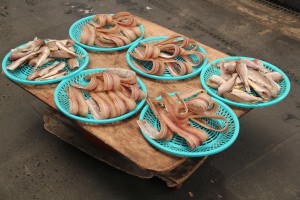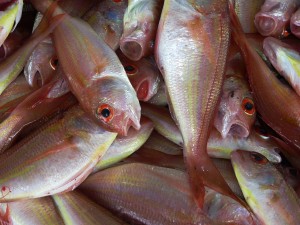Sustainable aquaculture can be a major sector of farming to produce enough food for the increasing demands of the future. Producing food for everyone in future could become a challenging task. According to the Our World in Data , the world population is projected to reach around 11 billion by the end of the century. It will be a very difficult task to feed everyone, even with our advanced technology and resources.
Aquaculture as a Source of Protein
 The biggest global survival task for the future may be producing enough food for everyone, and aquaculture just may be the right option for us to step up to the plate.
The biggest global survival task for the future may be producing enough food for everyone, and aquaculture just may be the right option for us to step up to the plate.
Fish have always played an important role in supplying animal based protein. People around the world have depended on wild caught fish and ocean fish stocks for survival. Fish have also played an important role in our economy. It has provided livelihood for millions of fishermen in the coastal areas, where the only viable source of food were fish.
Fish is a Superfood
Fish is rich in amino acid contents, and also has high amounts of omega-3 fatty acids, which are healthy for us.
However, our ocean fish stocks are not limitless, and we have already overfished our oceans, depilating the natural ecosystem and habitat. Aquaculture has grown rapidly to address the issues associated with wild caught fish. It produces enough fish to allow wild fish stocks to regenerate and it also gives the wild ecosystem a rest.
Environmental Costs of Aquaculture
Just like any other fields of agriculture, aquaculture has come under intense scrutiny and criticism. Improper fish farming practices could indeed cause significant environmental problems.
Fish farming uses resources like water, land and fossil fuels and interacts with the environment. Moreover, there are unnatural elements like GM foods and synthetic foods being introduced into the system.
High Intensity Fish Farming
 Environmental impacts are especially true with high intensity aquaculture, where high input is needed to produce high outputs. For example, raceway and cage fisheries are often criticized for being a major polluter and contaminator of natural bodies of water.
Environmental impacts are especially true with high intensity aquaculture, where high input is needed to produce high outputs. For example, raceway and cage fisheries are often criticized for being a major polluter and contaminator of natural bodies of water.
Over populated fish farms often pollute nearby natural habitat with farm waste, runaway chemicals, disease and parasites.
Interbreeding of Farmed Fish
Farmed fish are often stronger, more resilient and competitive compared to the naturally occurring fish, and when they escape into the natural environment, they may alter or cause damage to the natural ecosystem. When they interbreed with natural fish, they may alter or influence the evolutionary process in nature.
The Solutions
To produce more food without the negative impacts on the environment, we must practice responsible aquaculture. Keeping our environment safe from wastages of fish farms, reducing the use of pesticides, antibiotics and other harsh chemicals, and increasing organic fish farming around the world are some of the ways aquaculture could become viable and environmentally safe.
Anyone who wishes to enter this industry must consider environmental factors. Using chemicals may seem beneficial and give you immediate results, but in the long run, they end up costing you more. Just imagine the environmental impacts and the health issues associated with it. When you consider the environmental costs and healthcare costs, it doesn’t make any sense to use methods that harm the environment, even if it seems to give you immediate results.
Conclusion:
 While natural fish stocks are already overfished and depleted, aquaculture, or farming could play an important role in meeting global demand for protein.
While natural fish stocks are already overfished and depleted, aquaculture, or farming could play an important role in meeting global demand for protein.
When you practice aquaculture responsibly, you allow the wild fish population to grow, you reduce environmental impacts, and you produce healthy, palatable food for the world population. Your goals may be just to feed your family or to make some extra cash from your home based fish farm, but no matter what your goals are, do it responsibly, and practice good, clean and environmentally friendly aquaculture.
P.S: Would you like to learn more about home based fish farming? We’d love to hear from you. Please call us at (303) 495-3705 or put down your thoughts in the comment box below, it would inspire us greatly in our future blogs. Also, visit our Facebook page or, Join our mailing list to stay up to date on our technologies Subscribe.
Source: WorldWide Aquaculture
Related articles and resources:
- 5 Approaches to Making Aquaculture Sustainable
- Our World in Data
- Irresponsible aquaculture could threaten environment, report warns | WorldFish Press Release
- Global Survival Campaign – You can help change your world
- Turn your Home into a Home Based Fish Farm
- 5 Facts about Aquaculture & Farmed Fish That Everyone Should Know



